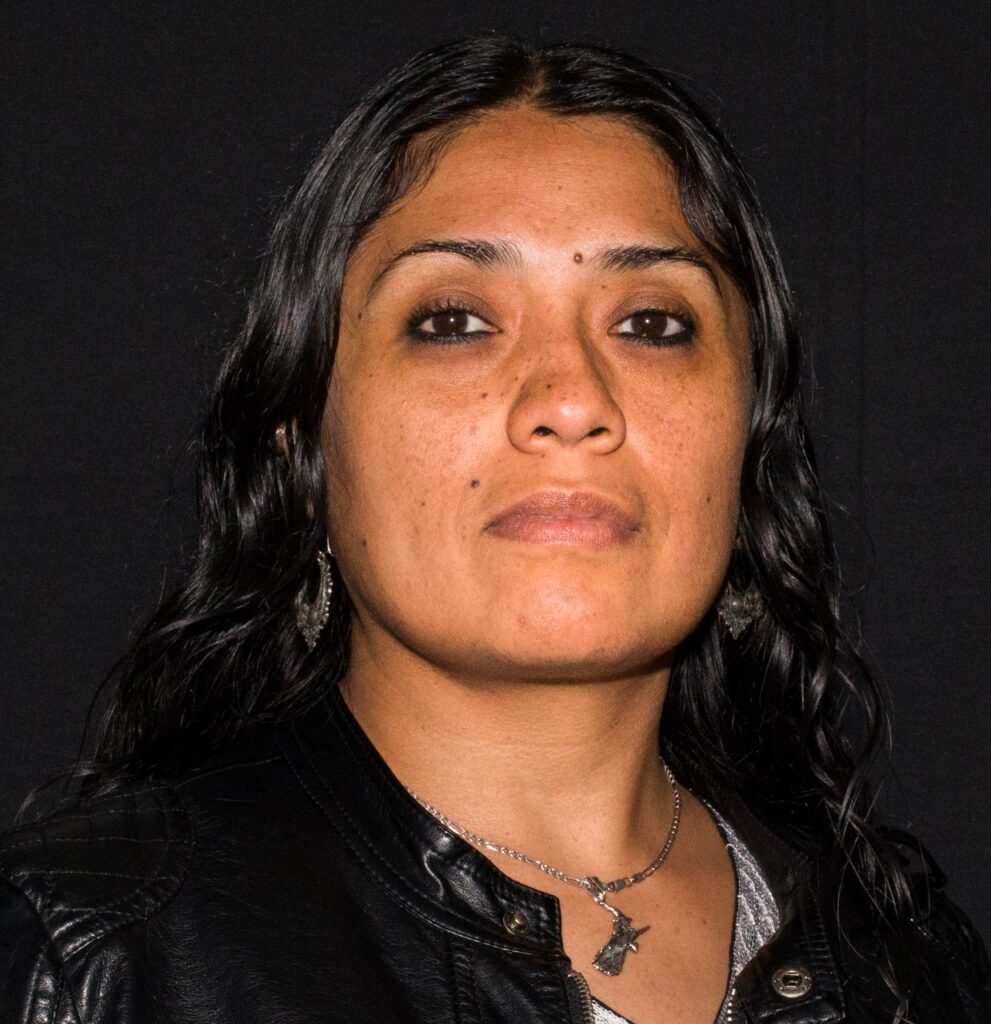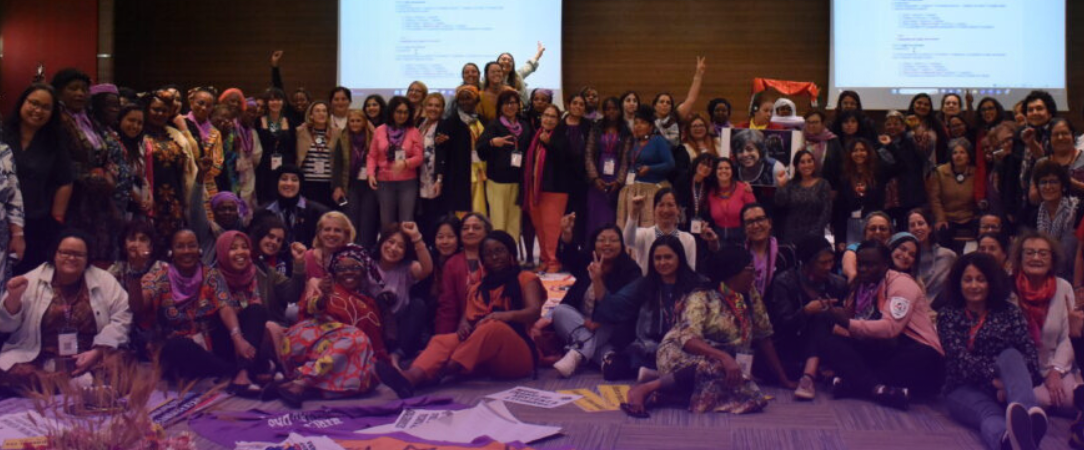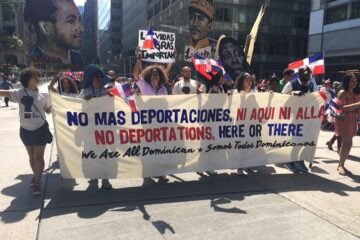Norma Cacho is a World March of Women (WMW) militant in Mexico. She has been a member of the movement’s International Committee since October 2023, as one of the representatives of the Americas, side by side with Alejandra Laprea, from Venezuela, and Cony Oviedo, from Paraguay (deputy). Norma has first become an activist in lesbian feminism, in collectives that reclaimed lesbian feminism as an anti-systemic political perspective. “From there, I started to see how complex the oppressions against women are, not only compulsory heterosexuality or the heterosexual regime, but also colonialism, patriarchy, racism, and capitalism, this web of oppressions and domination that ravishes women’s bodies and territories in the global South.”
Norma took part in regional and international education processes and was part of the methodology working group of the Berta Cáceres Feminist Organizing School of the WMW Americas in 2022. “I’m convinced that political education from a grassroots feminist education perspective is a vital strategy to strengthen feminist and mixed-gender movements, with focus on the perspectives built by women,” she argues.
In this interview you can read in English or listen to in Spanish, Norma shares her views about the challenges the feminist movement faces globally and regionally, and the contributions of grassroots feminism, feminist economy, and the alternatives proposed by women from their territories, bringing the local and global together.

How was it to join the World March of Women from a place of resistance that is lesbian feminist activism?

By reclaiming a lesbian feminist practice not as a sexual orientation or just an identity, but as an anti-systemic pratice and demand against the heterosexual regime imbricated with colonialism, patriarchy, and racism—this has been one of the contributions we have pursued in our reflections and conceptualizations at the WMW. At the regional level, I remember the International Meeting we had in Brazil in 2013, when we organized a large group of lesbians with T-shirts about these multiple oppressions. We reclaim ourselves as feminist lesbians, but we are also involved in processes to defend territories and build grassroots economic alternatives. We don’t see ourselves separated from the struggle for the defense of the territory or against extractivist and transnational companies, because we are also providing our reflections through lesbian feminism to observe all this systemic implication of different forms of violence against women.
I think it’s important to look back on the memory and history of the March as a movement where there have been contributions by lesbian feminists with epistemes, practices, and mobilization. We are there, and we continue to contribute.
You have just joined the International Committee of the World March of Women. What do you believe to be the tasks of the Americas to strengthen the WMW internationally?
We surely have challenges, pending goals, but, in political and epistemic terms, we are a region with great jointly articulated and accumulated political knowledge—not only between ourselves as a region, but also in connection with other global movements. This is a vision we will be able to imprint as our brand on the International Committee. We also have an important contribution to make by deepening theories, concepts, and education processes as we have in recent years. The history of the education processes of the World March of Women is an important achievement. We conduct political education processes all the time, not only with the Berta Cáceres International Feminist Organizing School, but also at the local level. Our national coordinating boards have grassroots feminist education as one of their main banners and as a pathway toward empowerment.
The International Committee is not only a consultative body—it is a deliberation body. Our sisters from different regions offer us a trust mandate to guide the political pathways of the WMW for at least the next two years. It is a substantial task, especially because we are living in a context of very strong attacks from the ultra-right, neoliberal fascism, transnational corporations taking over territories, the wars of occupation against the Palestinian people and the Sahrawi people, and many others. These struggles have always been present at the WMW, because we have sisters in these occupied territories.
In this context, we must strengthen the movement internationally in terms of alliances and ability to mobilize; and we must position not only our demands in face of these scenarios of occupation, war, and dispute, but also our perspectives toward transformation, as they are in their territories. Feminist economy has been one of our most powerful political perspectives in recent years, as well as our views about regional integration, grassroots feminism, and people power. This is a task for everyone, but the International Committee has a very important task in terms of providing political guidance.
At the 13th International Meeting of the WMW, you talked about the movement’s next International Action, to be held in 2025. In what way is it possible to combine memory and action to build a strong mobilization?
The 6th International Action must express the power of accumulated political knowledge from 25 years of the movement. The slogan we have defined for the 6th Action, “We march against wars and capitalism, for grassroots sovereignties and good living,” correctly summarizes our political perspectives in this crucial moment. The action must bring back the memory and the historical movement-building we have accumulated, but it also must be deeply mobilizing, showing our strength on the streets. The WMW’s international actions have been an example of the movement’s mobilization power.
After such a crucial moment as the pandemic we have experienced—which, even though it has not limited us as a movement, has redefined our conditions for mobilization—the 6th Action must be able to coalesce, organize, and be very powerful. While contexts may be different, with demands that make more sense in some territories than in others, we have many synergies, political convergence, and also a vision for the future and the movement. We also have to strengthen the character of the process. The Action always closes in a territory that is usually under dispute, but it is also a deeply political process that involves mobilization, education, and action.
You have addressed the international challenges of feminism. Now back to the Americas, what are the specific challenges of the region? What are the common battles in the territories on the continent? And how can the WMW contribute in this sense?
As Abya Yala moves toward far-right governments, this is a trend that requires a great critique—the last election in Argentina, others where progressive governments have won, but by very narrow margins, like in Brazil, and in Mexico, where now we are facing a hotly contested federal election. The right is not just that partisan ultra-right—the discourse has changed significantly; it’s a populist right with massive impact. Fundamentalisms, going hand in hand with the ultra-right, are creating a scenario that can escalate in the following years.
On the other hand, I consider that the extractivist and colonial economy will also become deeper and deeper. Extractivist policies and megaprojects are fighting over ancestral territories, especially Indigenous and Black territories, where women are offering their bodies and lives to the struggle and building anti-systemic practices and alternatives. The World March of Women has been building concrete practices for many years to tackle these scenarios. It is worth addressing the next agendas in the region, like the Latin American and Caribbean Day of Peoples’ Integration. I believe that a regional platform that draws from the local, territory-based struggle and from the perspectives of grassroots feminisms, progressive unionism, and movements for environmental and climate justice creates vital and essential synergies to face these fascist ultra-right scenarios.
The contribution that the World March of Women can make amid these scenarios in the Americas is to stress the importance of the lives of women and the peoples, placing life on center stage. This is part of the disruptive feminist economy that we are building as a movement. And this has a lot to do with the denunciation of international financial institutions that threaten people’s lives, of transnational corporations and corporate powers that are joining forces with the ultra-right to destroy the peoples’ lives. Our accumulated knowledge is not only about concepts or epistemologies: it is our practice.
__
Original language: Spanish




